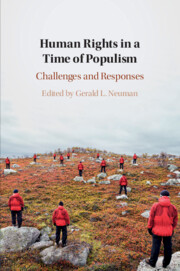Book contents
- Human Rights in a Time of Populism
- Human Rights in a Time of Populism
- Copyright page
- Contents
- Contributors
- Preface
- Acknowledgments
- 1 Populist Threats to the International Human Rights System
- 2 US Human Rights Policy and the Trump Administration
- 3 Rule-of-Law Rights and Populist Impatience
- 4 Populism and Human Rights in Poland
- 5 The Legal Architecture of Populism
- 6 Representation, Paternalism, and Exclusion
- 7 Penal Populism in Emerging Markets
- 8 The Populist Threat to Democracy in Myanmar
- 9 In Defense of Democratic Populism
- 10 Populism and International Human Rights Law Institutions
- 11 Human Rights Responses to the Populist Challenge
- Index
- References
11 - Human Rights Responses to the Populist Challenge
Published online by Cambridge University Press: 22 April 2020
- Human Rights in a Time of Populism
- Human Rights in a Time of Populism
- Copyright page
- Contents
- Contributors
- Preface
- Acknowledgments
- 1 Populist Threats to the International Human Rights System
- 2 US Human Rights Policy and the Trump Administration
- 3 Rule-of-Law Rights and Populist Impatience
- 4 Populism and Human Rights in Poland
- 5 The Legal Architecture of Populism
- 6 Representation, Paternalism, and Exclusion
- 7 Penal Populism in Emerging Markets
- 8 The Populist Threat to Democracy in Myanmar
- 9 In Defense of Democratic Populism
- 10 Populism and International Human Rights Law Institutions
- 11 Human Rights Responses to the Populist Challenge
- Index
- References
Summary
This concluding essay draws on the insights of earlier chapters and provides the author's own conclusions regarding how monitoring bodies in the human rights system should deal with the challenges created by the current wave of exclusionary populism. As the varied accounts illustrate, one size does not fit all. Moreover, international human rights institutions should not address populism as such, but should rather continue to focus on the specific human rights violations that populism leads to, and on the violations that have contributed to the rise of populism. Meanwhile, human rights institutions should also be attentive to the criticisms that populists have directed against the international human rights system, some of which (as examples show) may be meritorious even within a human rights analysis. These recommendations would not solve the problem that the spread of populism poses, but they would enable human rights institutions to contribute positively toward particular solutions.
Keywords
- Type
- Chapter
- Information
- Human Rights in a Time of PopulismChallenges and Responses, pp. 250 - 272Publisher: Cambridge University PressPrint publication year: 2020



